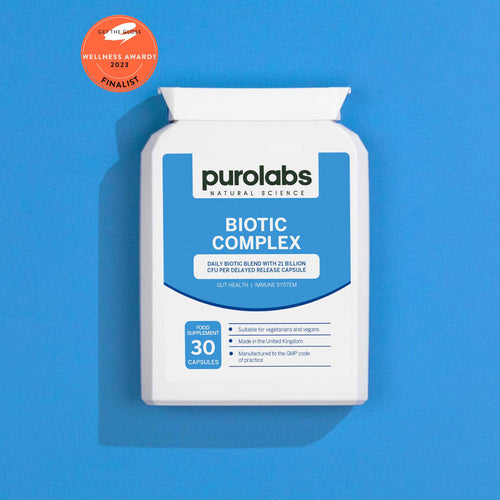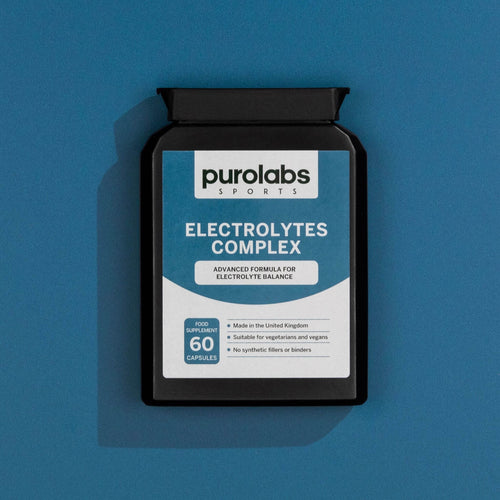The gut microbiome, or microbiota, is a vast network of bacteria, fungi, viruses and even parasites living in an ecosystem of its own. These microscopic organisms create chemicals that impact all aspects of human health.
Scientific literature is discovering the fact that the quality of our microbiome is quite possibly the biggest indicator of general health, longevity and vitality1.
What’s even more fascinating, is that our intestines, which expand to around 22 feet (7 metres in length) are tightly packed and contained within a human frame hosting trillions of live organisms. We are far from knowing all there is to know about the human microbiome and its non-human residents, with new discoveries being made at a staggering rate.
We don’t know the entirety of benefits that having a healthy, thriving and diverse microbiome leads to, but what we can safely say is that when it comes to good health – a balanced microbiome is non-negotiable.
What we can say though, is that it is currently an incredibly exciting field of health research so if you’re interested in how your gut health impacts your life – watch this space. We’ll make discoveries in the next decade that will seem unbelievable, but before we find all that out, in the meantime it’s safe to say that it’s important to make your gut health a priority.
Studies have confirmed that directly supporting our microbiome health is linked to:
- Weight management2
- A reduction of cardiovascular disease3
- Faster post-exercise muscle recovery
- Improved metabolic function, including type 2 diabetes4
- Improved mood and cognitive function5
Microbiome Energy Connection
One of the most commonly reported signs and symptoms of those with a microbiome imbalance is how groggy, lethargic and tired they feel.
You’ve likely felt it yourself. If you’ve experienced a period of constipation, for example, you feel sluggish, and even for many, have a lingering low mood. But the question is, why? Why would constipation or other common symptoms linked to poor microbiome health like bloating, diarrhoea and abdominal pain lead to fatigue?
Let’s take bloating first. Bloating can be linked to many drivers including:
- Hormone levels. Menopause, PMS, stress (yes cortisol is a hormone!) all can be linked to bloating.
- Eating or drinking too quickly, swallowing too much air
- Lack of exercise which impacts gut motility
- Eating large meals late at night
- Regularly consuming ‘trigger’ foods
So, what can chronic bloating lead to or signal when it comes to microbiome health?
Bloating is commonly a sign of poor digestion. One common mechanism is due to inadequate stomach acid. As food enters the mouth, digestion begins. Carbohydrate digestion begins in the mouth through the release of an enzyme called amylase. Food then travels down the oesophagus and enters the stomach where an enzyme called protease, along with the release of gastric juices help support protein breakdown and absorption.
If, by this point, we are struggling to produce or release enough enzymes to help with digestion in the stomach, not only do undigested food particles enter the small intestine but the rate at which they enter each stage of the digestive tract can slow down.
This is not ideal for our microbiome, which predominantly lives in the small intestine. Fats, which are absorbed in the intestines are undigested, leading to malabsorption of many fat-soluble nutrients along with other food items which can stagnate in the tract, leading to putrefaction (apologies) and fermentation from gut bugs, releasing gases and endotoxins which lead to cramps, bloating, constipation, diarrhoea and many common symptoms.
That in turn impacts digestion and leaves the gut vulnerable to dysbiosis – aka an imbalance of the good to bad gut bugs that make up the microbiome. We need a balanced ratio of good to bad gut bugs to help with nutrient absorption6, and to help reduce inflammation in the gut due to an overload of microbial endotoxins7.
Malabsorption and high levels of inflammation within the body are directly linked to fatigue, and loss of vitality.
Can Taking Probiotics, Prebiotics & Fibre Help Support Fatigue?
Now that we know what we eat, and how we digest what we eat has a large role on microbiome and energy – can commonly reported gut aids like pro/prebiotics and fibre help support microbiota health?
Much like with many aspects of our health…the answer is both yes and no.
For the average, healthy human, foods that feed and replenish our microbiome are wonderful tools to our daily health kit.
Our biotic complex for example contains 15 varying strains of beneficial bacteria, which are designed to bypass the acidic stomach and enter the microbiome alive.

Biotic Complex
A healthy microbiome is a diverse one, with a multi strain probiotic one of the most beneficial daily supplements you can take. Prebiotics (which are also included in our biotic complex) in food or supplemental form are also great food options to nourish a vibrant microbiome and support energy and wellbeing.
There are countless studies on the benefits of eating fermented foods (probiotics) and microbiome diversity. Foods including the below have been studied for their microbiota boosting properties8:
- Kimchi
- Probiotic yoghurt and fermented dairy products
- Sauerkraut
- Kefir
Food examples of prebiotics include:
- Kiwi
- Bananas
- Grains: Wholegrain rye, barley, wholegrain wheat, oats
- Flaxseed
- Cabbage
- Onions and garlic
A caveat which must be discussed when it comes to fibre, pre and probiotic intake are those who are at risk of conditions like Small Intestinal Bacterial Overgrowth (SIBO). SIBO is a condition where dysbiosis occurs in the small intestine, with probiotics and food for gut bugs aka prebiotics potentially exacerbating the imbalance.
Whilst some studies outline that probiotics may be useful for SIBO9, a helpful method to assess whether SIBO may be the case for you is to know how your body responds to probiotic foods, prebiotic foods and a high fibre diet. If you find that a gradual increase in these elements leads to intense bloating, fatigue and brain fog then do consider working with a licensed healthcare practitioner to carry out testing to assess the current state of your microbiome and work on a personalised gut health plan to address the underlying drivers.
How to Improve Energy Levels Through Diet
What we eat can have the most profound effect on our energy and vitality levels and can be overlooked when it comes to combating fatigue.
1. Blood Sugar Balance – dysregulated blood glucose levels through a high sugar, high processed diet will make the healthiest of humans feel fatigued10. Opt for a wholefoods diet, which contains a source of protein in every meal. Opt for wholegrains and plenty of fruits and vegetables.
2. Ensure that you’re eating enough calories – A simple but effective element to check. Find a calorie calculator online, input your health metrics and track your calories for a day to check that you’re eating enough calories. Many under or overestimate daily caloric intake.
3. Boost antioxidant intake – Antioxidants help to mop up inflammatory and fatigue inducing free radicals. A wholefoods diet which contains a range of fruit and vegetables is a great option to boost fibre and antioxidant intake.
Our mitochondria, which is the energy producing powerhouse organelle that lives in every single cell in our body requires adequate hydration in order to function optimally. A simple but effective way to ensure that you’re obtaining the correct mineral balance, which is key for hydration, is to opt for our electrolytes complex.
What makes our electrolyte complex so different from others is that we don’t add glucose aka sugar to our ingredients. Our complex is simple and effective, containing the perfect ratio of minerals to help hydrate our cells and support energy and vitality.


 Beauty
Beauty
 Bone Health
Bone Health
 Brain Health
Brain Health
 Energy
Energy
 Eye Health
Eye Health
 Gut Health
Gut Health
 Hair
Hair
 Hormonal Health
Hormonal Health
 Heart Health
Heart Health
 Immunity
Immunity
 Joints
Joints
 Menopause
Menopause
 Pregnancy
Pregnancy
 Kids
Kids
 Sleep
Sleep
 Stress & Mood
Stress & Mood




















